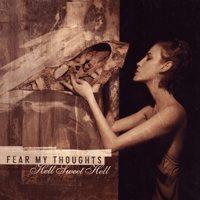
Fear My Thoughts
Hell Sweet Hell (2005)
Jordan Rogowski
I think there's been enough bands as of late riding the At the Gates Express to completely dismiss most in that description who aren't Darkest Hour. Fear My Thoughts are not Darkest Hour, and because of this they already have a strike against their favor.
To be far, for what it is, you can't really fault the band. Their songs all possess that sweet metal riffage and those vocals bouncing up and down the scales that everyone seems to love. The band's vocalist, Mathias Von Ocki, doesn't sound very far off from Guy of Red Chord fame, and take that as you will depending on whether or not you're a fan of his vocal style. Von Ocki has a tremendous range, with lows sounding just as well as the highs, but with the normal vocals resting comfortably but aggressively somewhere in the middle. As with any band influenced by the Scandinavian metal scene, however, it's the guitar work that's the biggest draw, and if this German quintet does anything well, it's that.
Residing far beneath the levels of menacing vocals are killer riffs just waiting to have their time to shine. "The Master's Call" bursts right into some lightning quick chord progressions, as drummer Norman Lohnard keeps the frenzied pace going. Thankfully, the almost annoying use of double bass that's become so prevalent is kept to a minimum, and when it's used, it doesn't sound as forced or contrived as it often does. The pounding guitars of Markus Ruf and Patrick Hagmann coalesce extremely well to form a fluid and punishing attack. Clean solos like the one found in "The Masters Call" liven up a sound that could, without it, easily grow mundane. It's by the ninth track, "The Ghosts of Time," that the band runs into trouble.
Making a quick foray into the world of metallic hardcore, Fear My Thoughts come off as a rehashed version of every other metalcore band around, and the sung vocals that give off a nü-metal vibe making sporadic appearances really don't help matters. It could have been a decent track, but things were thrown so off kilter with that singing that the band doesn't regain their footing until the album-closing "Trying to Feel." The epic, almost entirely instrumental track shows the band in a different and varied light that they would have done wisely to show earlier. The varied rhythms and tempos sound great, and the lack of vocals are not missed at all. The album ends in fine fashion, but it takes some patience to get to that point.
It's a good effort by the European natives, but it's going to likely take an all-out blitzkrieg next time around to really get some solid stateside exposure.